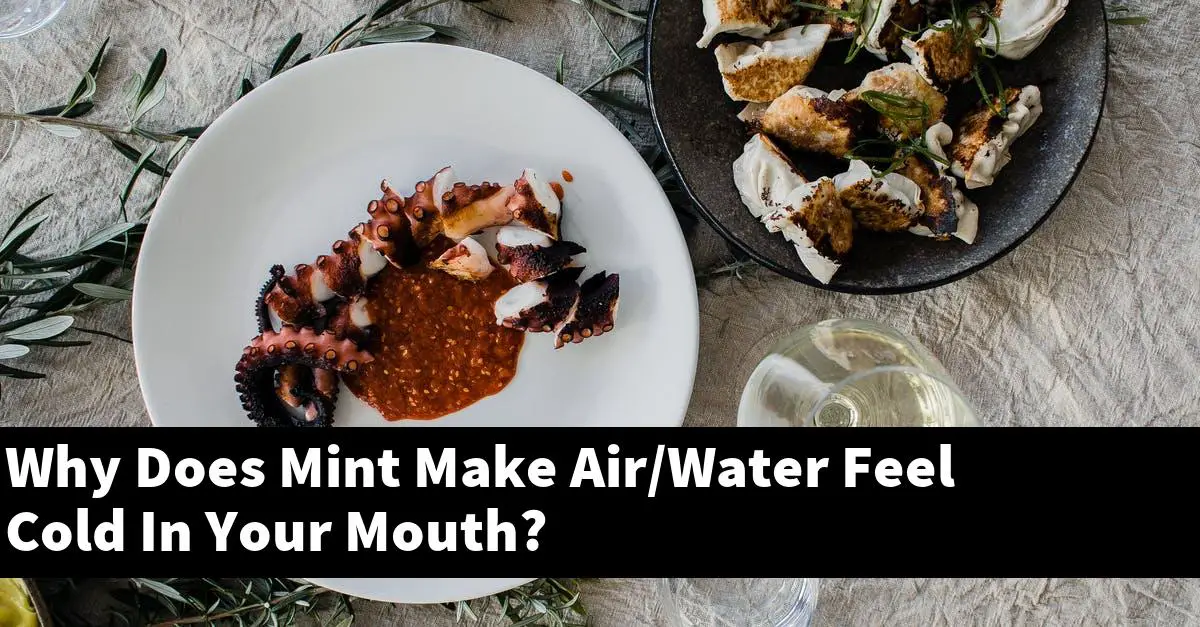Mint is a popular flavor used in many foods and drinks. It is also used in some toothpastes and mouthwashes.
Mint has a cooling effect on the body. When mint is consumed, it causes the body to release a hormone called norepinephrine.
Norepinephrine is a vasoconstrictor, which means it constricts blood vessels. This constriction of blood vessels causes the body to feel cooler.
Why does gum taste like cold water?
The reason that cold water tastes like gum is because when water molecules condense, they form ice. Gums are made up of sugar molecules and when they freeze, they form a solid.
The sugar molecules are arranged in a way that they form a network, and this network is what gives gum its characteristic texture.
Why does mint gum make water feel so cold?
Mint gum can make water feel cold because the mint flavoring interacts with the body’s natural cooling mechanism. When mint is chewed, it breaks down into smaller molecules that are absorbed into the bloodstream.
These smaller molecules travel to the brain, where they stimulate the trigeminal nerve. This nerve controls the body’s temperature and sends signals to the brain telling it to cool down.
Why does mint make me sneeze?
Mint is one of the most common allergen triggers. When the allergen (in this case, mint) is inhaled, it can cause an allergic reaction in some people.
This reaction can cause a sneeze.
Why does peppermint oil feel cold?
Peppermint oil is a mentholated oil which means that it contains menthol. Menthol is a substance that is cold-sensitive and when applied topically to the skin, it causes a cooling sensation.
Why does menthol make you feel cold?
Menthol is a chemical that is responsible for the cooling sensation that people feel when they apply menthol to their skin. Menthol has a strong cooling effect on the skin and is also known to block nerve impulses.
What makes mint color?
Mint is typically a light green color because of the presence of a green pigment called chlorophyll.
Why is water colder with mints?
When water is mixed with mints, the mints act as a natural antifreeze. This is because mints are high in menthol, which is a natural coolant.
The menthol also coats the water molecules, and keeps them from sticking together. This means that the water molecules are able to move around more easily, and as a result, it is colder.
Why does mint taste so good on your tongue?
Mint has a high concentration of menthol which is responsible for the minty taste. Menthol is a coolant and a stimulant which helps the body to cool down.
When the minty taste is detected by the brain, it triggers the pleasure centers and enhances overall taste perception.
Why does mint hurt my mouth?
Mint is a very refreshing herb that is often used in foods and beverages. However, when mint is ingested in large quantities, it can cause some people to experience a burning sensation in their mouth.
This is because mint is known to contain menthol, which is a numbing agent.
Why does mint make your eyes water?
Mint is a strong irritant to the eyes. When rubbed on the eyelids, mint oil irritates the eyes and causes them to water.
Why does mint make my mouth water?
Mint is known to have a numbing effect on the tongue, which can cause saliva to flow more freely. Additionally, mint is thought to stimulate the digestive system and help break down food.
Thisaction leads to the release of stomach acids, which can make your mouth feel tingly and watery.
Why do mints make my mouth feel cold?
Mints contain menthol, a chemical that makes the mouth feel cold. The menthol numbs the tongue and the back of the throat, preventing saliva from reaching the food.
Summary
The mint plant is a member of the Lamiaceae family, which includes other herbs such as basil, rosemary, and sage. The plant produces a compound called menthol, which gives mint its characteristic aroma and flavor.
Menthol also has a cooling effect when it comes into contact with the skin or mucous membranes. When you eat mint or drink mint-infused water, the menthol in the mint interacts with the receptors in your mouth and nose.
This sends a signal to your brain that temperature has dropped, even though it hasn’t.

